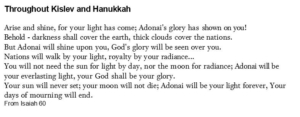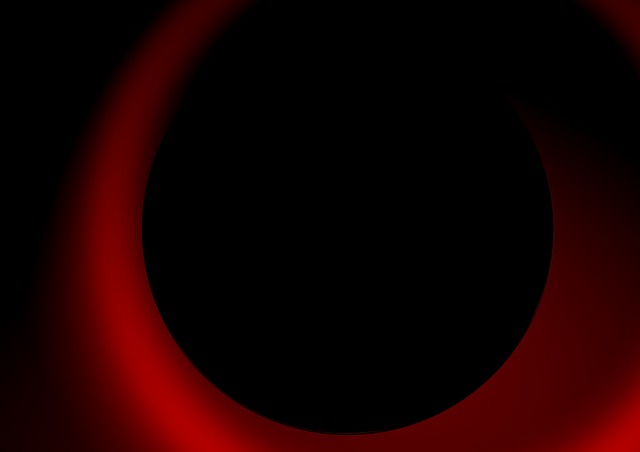| Source (Hebrew) | Translation (English) | Transliteration (Romanized Hebrew) |
|---|---|---|
ק֥וּמִי א֖וֹרִי כִּ֣י בָ֣א אוֹרֵ֑ךְ וּכְב֥וֹד יְהוָ֖ה עָלַ֥יִךְ זָרָֽח׃ כִּֽי־הִנֵּ֤ה הַחֹ֙שֶׁךְ֙ יְכַסֶּה־אֶ֔רֶץ וַעֲרָפֶ֖ל לְאֻמִּ֑ים וְעָלַ֙יִךְ֙ יִזְרַ֣ח יְהוָ֔ה וּכְבוֹד֖וֹ עָלַ֥יִךְ יֵרָאֶֽה׃ וְהָלְכ֥וּ גוֹיִ֖ם לְאוֹרֵ֑ךְ וּמְלָכִ֖ים לְנֹ֥גַהּ זַרְחֵֽךְ׃ (ישעיה ס:א-ג) |
Arise! Shine for your light has come; יהוה’s kavod[1] kavod כבוד – often translated as “glory.” Alternately, “divine resplendent spirit” has shined on you! Behold – darkness shall cover the earth, thick clouds cover the people, but יהוה will shine upon you, their kavod will be seen over you. Nations will walk by your light, royalty by your radiance. (Isaiah 60:1-3) |
Kumi ori ki va orekh ukhevod Adonai alayikh zaraḥ! Kihinneh haḥoshekh yekhasseh erets vaˈarafel leˈummim veˈalayikh yizraḥ Adonai ukhevodo alayikh yeraˈeh. Vehalekhu goyim leˈorekh umelakhim lenogahh zarḥekh. |
לֹא־יִֽהְיֶה־לָּ֨ךְ ע֤וֹד הַשֶּׁ֙מֶשׁ֙ לְא֣וֹר יוֹמָ֔ם וּלְנֹ֕גַהּ הַיָּרֵ֖חַ לֹא־יָאִ֣יר לָ֑ךְ וְהָיָה־לָ֤ךְ יְהוָה֙ לְא֣וֹר עוֹלָ֔ם וֵאלֹהַ֖יִךְ לְתִפְאַרְתֵּֽךְ׃ לֹא־יָב֥וֹא עוֹד֙ שִׁמְשֵׁ֔ךְ וִירֵחֵ֖ךְ לֹ֣א יֵאָסֵ֑ף כִּ֣י יְהוָ֗ה יִֽהְיֶה־לָּךְ֙ לְא֣וֹר עוֹלָ֔ם וְשָׁלְמ֖וּ יְמֵ֥י אֶבְלֵֽךְ׃ (ישעיה ס:יט-כ) |
You will not need the sun for light by day, nor the moon for radiance. יהוה will be for you the light of the cosmos, your elo’ah shall be for your enlightenment. Your sun will never set; your moon will not wane. יהוה will be your light in the cosmos, and your days of mourning will end. (Isaiah 60:19-20) |
Loˈyihyeh lakh od hashemesh leˈor yomam ulenogahh hayyareaḥ lo yaˈir lakh. Vehayalakh Adonai leˈor olam veˈlohayikh letifˈartekh. Lo yavo od shimshekh vireḥekh lo yeˈasef. Ki Adonai yihyeh lakh leˈor olam veshalemu yeme evlekh. |
Rabbi Levi Weiman-Kelman introduced the tradition of reading these verses from Isaiah during the month of Kislev through the end of Ḥanukkah in his Siddur Ha’Avodah Shebalev of Ḳehillat Ḳol HaNeshamah (R’ Levi Weiman-Kelman, R’ Ma’ayan Turner, and Shaul Vardi, 2007). The prayer is said at the end of Ḳabbalat Shabbat, after Psalms 93, and before Barkhu.
Although the season of recitation is not clear in the print copy, it is shown in the draft manuscript (provided courtesy of Rabbi Weiman-Kelman).
The translation provided here (published in Siddur Livnat HaSapir L’Kabbalat Shabbat, 2017) was adapted from the one made by Shaul Vardi in Siddur Ha’Avodah Shebalev (2007). –Aharon Varady.
Source


Notes
| 1 | kavod כבוד – often translated as “glory.” Alternately, “divine resplendent spirit” |
|---|

“תפילה לחודש כסלו עד סוף חנוכה | Prayer for the month of Kislev through the end of Ḥanukkah (from Isaiah 60), by Rabbi Levi Weiman-Kelman” is shared through the Open Siddur Project with a Creative Commons Attribution-ShareAlike 4.0 International copyleft license.










The translators have little feeling for English poetry or euphony. Rise! Shine! There is no ‘and’. The moon doesn’t ‘die’; it wanes. You sun will no more set. – it is a discontinuance. ‘light of the cosmos’? Was Isaiah a Greek? An English Jewish schoolchild could make a better job of this.
No need to be caustic. Thank you for your recommendations.